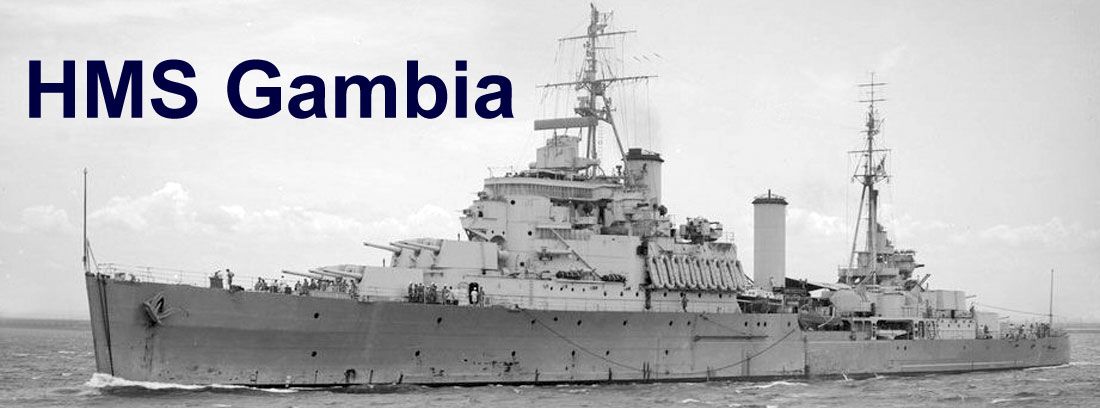
Eric Palmer
Eric was an Able Seaman on HMS Gambia from 1942 to 1943
I joined Gambia in September 1942 together with some 750 men - regulars, conscripts a fairly mixed bag. After an initial shakedown and appointment duties, we sailed on our first mission - torpedo trials on Loch Long, a beautiful Scottish Loch - but cold, cold! Thence on to Scapa Flow for our final sea trials, again - cold, cold! Then blessedly into the warm South Atlantic bound for our final destination Mombossa, East Africa, and base for the Far Eastern Fleet. St. Helena, Freetown, Cape Town, Durban and finally Mombasa, which was to be our base for a year.
Gambia was a happy ship under the command of Captain Mansergh, a great gentleman always courteous to all ranks (unless you put a foot wrong, of course). I had some personal contact with him, as I was, for a while, detailed to clean his quarters and never felt ill at ease in his presence. Even after 60 years, I still remember him with respect and affection.
Now, back to Mombasa. The Far Eastern Fleet comprised ships from half the free Nations of the World, Dutch, Free French, Norwegain, Canadian, you name it, they were there. Gambia was a bit of a dogsbody in the Indian Ocean, watchdog against roving Japanese, countless convoys, missions to the Seychelles. We crossed and recrossed the equator regularly.
We also carried a contingent of Marines including a very fine band. Myself and my old shipmate "Hutch" (who has remained my friend over 60 years) were both musicians and were welcomed into the Marine Band. There was a wealth of talent on the Gambia and we gave regular concerts in the Aircraft Hanger. Where ever we stayed for a refit the locals usually threw parties or dances for the Officers at which we supplied the music - a pleasant pay-off for our musical abilities!
I must now recount the Battle of Tamatave! Madagascar, a strategic island off the coast of Africa was then in the hands of the Vichy French and although there had been a reasonably successful British landing in the North, parts of the island remained in Vichy hands. So, a veritable Armada sailed to subjugate the regional town of Tamatave. We stood a fair way off shore and demanded that they surrender - without response! The call was repeated and again ignored and we were then commanded to fire one round apiece. I was in one of the forward 6" gun turrets apprehensively awaiting the scream of enemy shells! Well, the Armada fired its round and knocked out the Lighthouse and about one thousand Date Palms! Eventually, a lone figure came pedalling down the jetty on a bicycle bearing a White Flag! so ended The Battle of Tamatave!!
The ultimate achievement of our duties in the Indian Ocean was to convoy forty thousand Australian Troops from the Middle East back to Australia. This had to be the mightiest convoy of the Second World War. All the Great Liners of the World had been commandeered to take them home to Freemantle, Western Australia. Isle De France, RMS Queen Mary, SS Amsterdam, Normandie and others I can't remember plus an armada of guarding warships comprised the convoy. In retrospect it was a logistical miracle to convoy an entire Army safely across a dangerous sea without loss of man or ship.
We stayed in Freemantle for quite an extensive refit, prior to sailing back to England. I fell in love with Australia on the spot and after many vicissitudes, returned with a wife and son in 1948 to spend the rest of my life in this wonderful Country. Gambia returned to England sometime in July 1943 to a cold, bleak Liverpool day. My last and final memory of the Gambia was of Gangway Duty to witness the final humiliation of our lovely new ship being fumigated against bed bugs, cockroaches and other nasties collected from our friends of the Far East!
I won't be reconciled to her being turned over to the New Zealand Navy (Australians aren't all that keen on Kiwis!) In my recollection she is still as she was when I left her in 1943. If there are any of my shipmates still alive and I guess there are not that many, please forgive any lapse of memory of an old A.B.